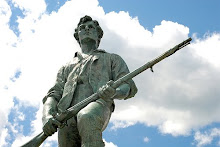The latest edition of Columbia includes an article by Alton J. Pelowski entitled "In Defense of Life, Love and Freedom" describing the problems when a private charity becomes dependent on public funding. Similarly, Catholic Charities in Illinois are closing their adoption services because of new requirements to change their screening criteria to accept gay couples in order to receive government funding.
Although I empathize with their distress, American Catholics who have traditionally supported government-sponsored social programs have only themselves to blame. Non-profit organizations who have been happy to trade arduous fund-raising for siphoning tax revenues are likewise guilty.
"Free money" is always hard to resist, but there's always a catch. Once you've accepted the money you lose the freedom to run your organization as you like (which is why some organizations like Hillsdale College eschew public funding).
Indeed, the Catholic charities are faced with a dilemma of their own making. If they refuse to compromise their principles for money, they must either close their doors or return to the days when they relied on their own voluntary fund-raising efforts. The latter option is obviously more difficult; a consequence of diverting funds from private donations to publicly mandated tax revenue.
Instead it looks like they're taking the easy option: quitting.
Showing posts with label life. Show all posts
Showing posts with label life. Show all posts
Friday, December 30, 2011
Saturday, June 12, 2010
Life, Liberty... and Property
No one ought to harm another in his life, health, liberty, or possessions. - John Locke
The right of property is that which every citizen has of enjoying and of disposing at his discretion of his goods and income, of the fruits of his labor and industry. - French Constitution of 1793
That all men are by nature equally free and independent, and have certain inherent rights... namely, the enjoyment of life and liberty, with the means of acquiring and possessing property, and pursuing and obtaining happiness and safety. - Virginia Declaration of Rights, 1776
That the inhabitants of the English Colonies in North America, by the immutable laws of nature... are entitled to life, liberty, and property, and they have never ceded to any sovereign power whatever, a right to dispose of either without their consent. - DECLARATION OF COLONIAL RIGHTS, FIRST CONTINENTAL CONGRESS, 1774
Property does not exist because there are laws, but laws exist because there is property. - Frédéric Bastiat
The right of man to private property is, therefore, the right to enjoy one's property and to dispose of it at one's discretion (a son gre), without regard to other men, independently of society, the right of self-interest. This individual liberty and its application form the basis of civil society. - Karl Marx, 1843
Government originated in the attempt to find a form of association that defends and protects the person and property of each with the common force of all. - Jean Jacques Rousseau
The recognition of individual rights entails the banishment of physical force from human relationships: basically, rights can be violated only by means of force... The only function of the government, in such a society, is the task of protecting man’s rights.
In a capitalist society, all human relationships are voluntary. Men are free to cooperate or not, to deal with one another or not... i.e., by means of discussion, persuasion, and contractual agreement, by voluntary choice to mutual benefit. The right to agree with others is not a problem in any society; it is the right to disagree that is crucial. - Ayn Rand
The right of property is that which every citizen has of enjoying and of disposing at his discretion of his goods and income, of the fruits of his labor and industry. - French Constitution of 1793
That all men are by nature equally free and independent, and have certain inherent rights... namely, the enjoyment of life and liberty, with the means of acquiring and possessing property, and pursuing and obtaining happiness and safety. - Virginia Declaration of Rights, 1776
That the inhabitants of the English Colonies in North America, by the immutable laws of nature... are entitled to life, liberty, and property, and they have never ceded to any sovereign power whatever, a right to dispose of either without their consent. - DECLARATION OF COLONIAL RIGHTS, FIRST CONTINENTAL CONGRESS, 1774
Property does not exist because there are laws, but laws exist because there is property. - Frédéric Bastiat
The right of man to private property is, therefore, the right to enjoy one's property and to dispose of it at one's discretion (a son gre), without regard to other men, independently of society, the right of self-interest. This individual liberty and its application form the basis of civil society. - Karl Marx, 1843
Government originated in the attempt to find a form of association that defends and protects the person and property of each with the common force of all. - Jean Jacques Rousseau
The recognition of individual rights entails the banishment of physical force from human relationships: basically, rights can be violated only by means of force... The only function of the government, in such a society, is the task of protecting man’s rights.
In a capitalist society, all human relationships are voluntary. Men are free to cooperate or not, to deal with one another or not... i.e., by means of discussion, persuasion, and contractual agreement, by voluntary choice to mutual benefit. The right to agree with others is not a problem in any society; it is the right to disagree that is crucial. - Ayn Rand
Subscribe to:
Posts (Atom)







